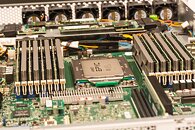Cloudflare: Blockchain Platform Targeted by One of Most Powerful DDoS Attacks in History
Internet services provider Cloudflare has announced that it has successfully protected one of its clients from one of the most powerful DDoS (Distributed-Denial-of-Service) attacks in history. According to the services provider, an undisclosed cryptocurrency platform was targeted by a botnet comprising around 6,000 "zombie" computers distributed throughout 112 different countries. The botnet ultimately generated a collective 15.3 million requests per second. While that's still shy of the largest recorded metric - set at 17.2 million requests per second - the fact that the DDoS attack occurred through HTTPS likely pushed its complexity above the record-setting attack, due to the higher computational workload of secure HTTP. The attack lasted 15 seconds.
DDoS attacks aim to flood a network with requests and data packets in a bid to overload and paralyze it. The attack also showcases the ingenuity of bad actors, as the originated from cloud-based ISPs, as attackers leverage more complex and capable networking hardware than what's usually offered by last-mile ISPs. According to Cloudflare, the botnet seems to have mostly compromised systems with Java-based applications that were still open to the recently-discovered CVE-2022-21449 vulnerability.
DDoS attacks aim to flood a network with requests and data packets in a bid to overload and paralyze it. The attack also showcases the ingenuity of bad actors, as the originated from cloud-based ISPs, as attackers leverage more complex and capable networking hardware than what's usually offered by last-mile ISPs. According to Cloudflare, the botnet seems to have mostly compromised systems with Java-based applications that were still open to the recently-discovered CVE-2022-21449 vulnerability.









